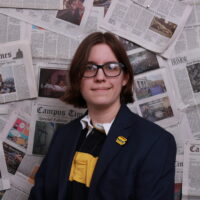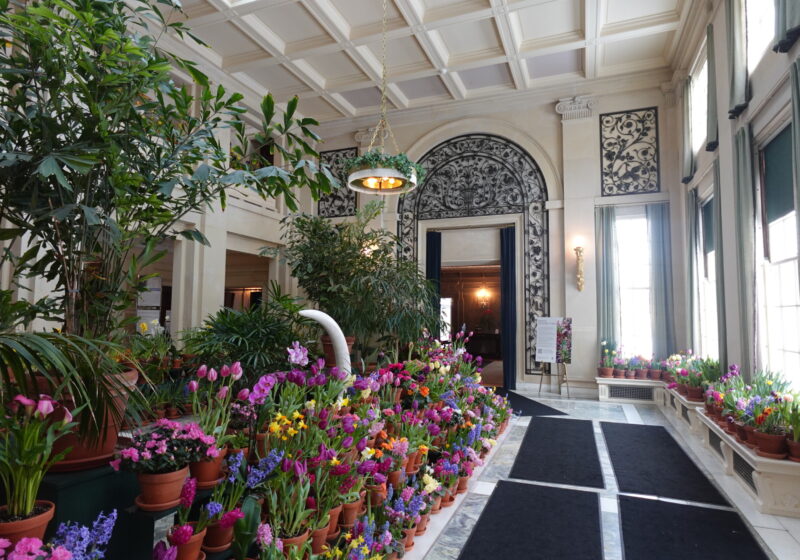Last Thursday, March 16, the Students’ Association (SA) hosted a Student Town Hall in an effort to connect administrators with voices from the student body.
Topics of interest ranged from mental health and University Counseling Center services, to ongoing issues with the SA Impact petition website and housing. For more than an hour, students brought up a variety of concerns and worries to the administrators in attendance.
Nevertheless, the discussion hinged on one main point: the construction of the Newman and Greenbaum Centers.
Most notably in attendance were Dean of the College in Arts, Sciences and Engineering Jeffrey Runner, Dean of Students Matthew Burns, and Provost David Figlio.
Seated in the front row, both deans and Provost Figlio had a clear view of the speakers and their concerns — the first of whom was junior Hannah Witkin.
With her trifold poster board in hand, Witkin gave a passionate speech on behalf of the Stop the Build protests that have developed in response to the faith-based institutions project.
“In my hand, I have signatures from 72 students who stand in opposition to the building of the Greenbaum Center for Jewish Life and the Catholic Newman Center,” Witkin said. “I guarantee you that we would have hundreds more if the SA Impact Petition website was functioning, but we had no choice but to go old school to demonstrate the students’ attitudes on the issue.”
According to Witkin, the SA Impact website has not been functioning for “weeks, if not months.” Historically, the Impact site has functioned as one of the student means to raise issues to administrators — especially for movements requiring data, such as a concrete number of signatories. The Impact site allows for students to create and vote on petitions of interest, and serves as “a dedicated space to rally your peers and the campus community around your ideas” as outlined on its About page.
Witkin then posed three questions to the attending administrators: How will the University ensure that institutional funding never goes towards the faith-based institutions? Why should any religious sect be given exclusive control over any portion of campus? Lastly: What did administration have to say to the students of other or no religion on campus, who will not be represented by these buildings?
According to Dean Runner, funding is built into the plan for each of the two buildings. Interest earned on each of the buildings’ initial endowments will be used to pay for maintenance and other general fees, which allows University funds to go untouched.
In response to the second question regarding religious sects being given exclusive control over parts of campus, Provost Figlio said that the plans don’t suggest exclusive control over any of the buildings’ spaces. “My understanding is that there would still be opportunities for groups outside of the religious groups to use these locations,” he said.
Broadly, Witkin’s third question went unanswered.
Following Witkin’s statements, senior and former Undergraduate Student Body President Sabeet Kazmi took to the floor to deliver a speech of his own.
According to Kazmi, there are a number of problematic elements associated with both of the proposed centers. The Greenbaum Center, he said, has an alarming connection to the leader of Hillel International at the University, who has previously called criticism of Israel antisemitic.
Kazmi referenced last year’s Medallion Program workshop conflict during his remarks, which ended early after presenter Joy Getnick, Executive Director for Hillel, forcibly muted students during a discussion on antisemitism and anti-Israel sentiments on campus.
The Newman Center, he later alleged, followed a similar pattern of singling out individuals and projecting specific values. In a copy of his notes provided to the CT, “homophobic sentiments” and “alienation of students” are listed among his top concerns.
Broadly, Kazmi made reference to “the violation of our Meliora values” throughout his speech: equity, leadership, integrity, openness, respect, and accountability.
Nevertheless, Kazmi maintains a complete sense of “love and appreciation” for University administrators.
“I love and appreciate all of you,” he said. “I mean, we gave the SA Admin award to [the Office of the Dean of Students], and I, as part of the National Search committee for the new Provost, wrote my most enthusiastic recommendation for Provost Figlio because of his commitment to our values, and the integrity he showed. I would just now like to see you show it.”
Following the town hall, the CT reached out to Witkin and Kazmi for comment on the event.
Both students expressed profound disappointment with the administration’s response. Kazmi was sympathetic to Provost Figlio’s lack of context around some of the issues discussed, having only joined the University last year, and understood Dean Burns’ limited power and imminent departure from his position in four months.
Nevertheless, he was “troubled” by the lack of responses from Dean Runner. Kazmi provided copies of his notes to all administrations — but Runner was “the only person” to leave them behind.
According to Kazmi, Runner’s failure to engage with the student body on a meaningful level reflects a “sense of disregard and carelessness” around the work done by a variety of student leaders.
At the core of the problem, however, is a lack of clarity, Kazmi says.
Witkin echoed these sentiments, saying that the administration “often talked around questions without meaningfully answering them.”
“Rather than holding the institution accountable or taking a stance on the issue, they evaded responsibility by saying the decision was not made by them,” she said. “They basically admitted what we have always known — that it didn’t matter what students had to say because meeting the coalition’s demands would ‘reduce the trust in future donors to contribute funds to the university.’”
Ultimately, Witkin was glad to see so many students come out to advocate against the building projects, but felt that the town hall was “a performative way for administration to feign accountability.”
Following discussion with the student speakers, the CT reached out to Dean Runner, Dean Burns, and Provost Figlio for further comment.
Burns hoped to have “demonstrated an eagerness to listen and respond to students” during his tenure as Dean, and expressed belief that his colleagues would be able to continue the trend.
He then acknowledged the town hall as a difficult format of expression. Although the students made their frustrations clear, Burns said, town halls are “not always the best way to reach a true understanding of participants’ intentions,” or how to resolve the issues at hand.
“I think, in one way or another, faith-based projects must continue,” Burns said. “What is perfectly clear is that the religious and spiritual needs of our campus have to be addressed in better and broader ways. About that, I think there is widespread agreement.”
Provost Figlio mentioned that he and President Mangelsdorf are “committed to incorporating student voice into new initiatives and rethinking the things we already do.”
“It’s very hard to change plans that have been in the works for eight years,” he said. “What we can change, however, is how we incorporate student input into these types of projects going forward.”
Now, Figlio aims to evaluate the space and programming needs of the University’s diverse community. He’s hoping to compose an “action plan” that considers the faith-based buildings, upgrades to existing spaces, and the University’s master plan in order to better serve the community in the future.
Similarly, Dean Runner emphasized his appreciation of student voices to administration despite not being able to respond to many of the points raised.
When asked about the status of the faith-based projects in light of the Stop the Build protests, Runner confirmed that construction of the Greenbaum and Newman centers will continue as planned.
“I see faith communities as one important way for students to find connection and belonging, and I am eager to create spaces and opportunities for all students that foster belonging.“ he said.






